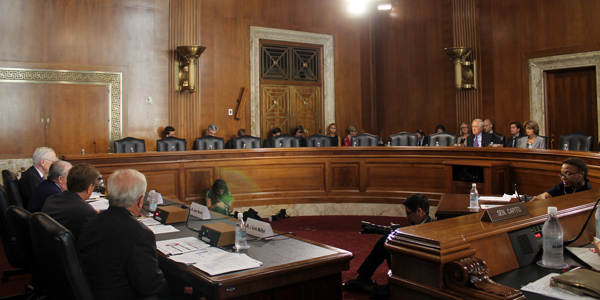By Michael Brooks
WASHINGTON — The Senate Energy and Natural Resources Committee returned Thursday to the issue of natural gas infrastructure permitting following reports of increasing delays at FERC.
Two former FERC chairmen, James Hoecker (1997-2001) and Joseph T. Kelliher (2005-2009), agreed with J. Curtis Moffatt, general counsel for Kinder Morgan, and James Murchie, CEO of investment advising firm Energy Income Partners, that failing to build adequate pipelines would lead to higher prices for consumers. They also said delays in state and federal approvals cause uncertainty and could discourage down investment.
While these sentiments aren’t new, they came on the heels of a report by Bloomberg on Wednesday that FERC has notified several developers of LNG export terminals that their applications could be delayed by 12 to 18 months as it struggles to deal with its backlog. The commission asked the developers to consider sending private contractors to help, according to Bloomberg’s sources.
In a series of tweets before the story broke, Commissioner Neil Chatterjee suggested better pay for staff and opening a regional office in Houston, “the center of the world” for natural gas.
FERC Chairman Kevin McIntyre told the committee at an oversight hearing last month that the commission has 14 pending LNG applications, up from four in 2007.
McIntyre said the commission has hired private contractors to supplement its workforce and is seeking to hire additional engineers, while also considering reallocating other staff and hiring additional contractors. It also is seeking to improve coordination with the Department of Energy and the Department of Transportation and seeking internal efficiencies.
The panelists at Thursday’s hearing made no mention of commission staffing as a problem. Rather, they mostly offered suggestions for how the commission could more efficiently process pipeline applications.
Kelliher, executive vice president for federal regulatory affairs for NextEra Energy, said FERC could be more transparent in its certificate orders about how it weighs the benefits and adverse impacts of projects. “There is a need to clarify whether and how environmental impacts should be weighed in this balancing, and whether the commission’s environmental review is under the auspices of the National Environmental Policy Act of 1969 or part of the broader public interest determination in the Natural Gas Act,” he said.
Kelliher said the pre-filing process that formerly took six to eight months now takes up to 12, while the certificate process that used to take nine to 11 months now takes two years or longer. “One factor that has contributed to the length of the certificate process is delays in approvals from other federal agencies,” he said. “If these delays are driven by resource limits at these agencies, the cost incurred by these agencies could be reimbursed by pipeline developers in a manner consistent with how the costs of other federal agencies in the hydropower licensing and relicensing process are recovered from hydropower licensees.”
The witnesses, along with several senators, noted that one of the major factors leading to delays is local opposition from environmentalists and landowners.
Murchie said the challenge for regulators was “getting people to understand that, while their land is being taken [under eminent domain], it’s being taken for a greater good, just like it is with a highway.”
FERC is already considering many of the issues discussed at the hearing as it reviews its 1999 policy statement on gas pipeline approvals. (See FERC Outlines Gas Pipeline Rule Review.)
Fears of FERC Deadlock
Committee Chair Lisa Murkowski (R-Alaska) said Thursday’s hearing was prompted by questions on gas and electric transmission infrastructure remaining following last month’s FERC oversight hearing. The Department of Energy’s efforts to provide financial support to coal and nuclear plants took up most of that discussion. (See FERC: No Emergency on Grid.)
It was not, she said, in reaction to the coming departure of Robert Powelson after only a year on the commission. (See Powelson Leaving FERC to Head Water Lobby.)
“We had all five commissioners here; it was good to see them,” Murkowski said in her opening remarks. “I don’t know, maybe we jinxed the whole thing.”
Murkowski asked Hoecker and Kelliher later in the hearing what they thought the committee should be looking for in Powelson’s replacement.
“I have long advocated that the members of the commission should include some seasoned economists [and] industry engineers, not just lawyers, as much as I love lawyers,” replied Hoecker, executive director and counsel to the trade group WIRES.
“I think they need someone who is comfortable with criticism,” Kelliher said. He also said they should be willing to work with their colleagues, “but only up to a point. It’s not supposed to be 5-0 on everything. It’s OK to dissent.”
Speaking to reporters after the hearing, Murkowski said she has not yet spoken to the Trump administration regarding a nominee, but that she hoped it would make the commission a priority. “You know, we worked very aggressively last year to get the FERC filled up,” she said, “and we’ll just do it again.”







